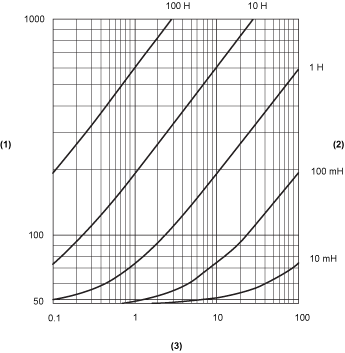This is the description characteristics for the TM5SDM12DT electronic module. See also Environmental Characteristics.
|
|
|
FIRE HAZARD |
|
Use only the correct wire sizes for the maximum current capacity of the I/O channels and power supplies. |
|
Failure to follow these instructions will result in death or serious injury. |
|
|
|
UNINTENDED EQUIPMENT OPERATION |
|
Do not exceed any of the rated values specified in the environmental and electrical characteristics tables. |
|
Failure to follow these instructions can result in death, serious injury, or equipment damage. |
The table below describes the general characteristics of the TM5SDM12DT electronic module:
|
General Characteristics |
|
|---|---|
|
Rated power supply voltage Power supply source |
24 Vdc Connected to the 24 Vdc I/O power segment |
|
Power supply range |
20.4...28.8 Vdc |
|
24 Vdc I/O segment current draw |
21 mA (all inputs On) |
|
TM5 Bus 5 Vdc current draw |
42 mA |
|
Power dissipation |
1.52 W max. |
|
Weight |
25 g (0.9 oz) |
|
ID code for firmware update |
8377 dec |
The table describes the input characteristics of the TM5SDM12DT electronic module:
|
Input Characteristics |
||
|---|---|---|
|
Number of input channels |
8 |
|
|
Wiring type |
1 wire |
|
|
Rated input voltage |
24 Vdc |
|
|
Input voltage range |
20.4...28.8 Vdc |
|
|
De-rating |
55...60 °C (131...140 °F) |
I = 0.3 A max. by channel |
|
Rated input current at 24 Vdc |
3.75 mA |
|
|
Input impedance |
6.4 kΩ |
|
|
OFF state |
5 Vdc max. |
|
|
ON state |
15 Vdc min. |
|
|
Input filter |
Hardware |
≤100 µs |
|
Software |
Default 1 ms, can be configured between 0 and 25 ms in 0.2 ms intervals. |
|
|
Isolation |
Between channels and bus |
See note 1 |
|
Between channels |
Not isolated |
|
1 The isolation of the electronic module is 500 Vac RMS between the electronics powered by the TM5 bus and those powered by 24 Vdc I/O power segment connected to the module. In practice, the TM5 electronic module is installed in the bus base, and there is a bridge between the TM5 power bus and the 24 Vdc I/O power segment. The two power circuits reference the same functional ground (FE) through specific components designed to reduce effects of electromagnetic interference. These components are rated at 30 Vdc or 60 Vdc. This effectively reduces isolation of the entire system from the 500 Vac RMS.
The table describes the output characteristics of the TM5SDM12DT electronic module:
|
Output Characteristics |
||
|---|---|---|
|
Output channels |
4 |
|
|
Wiring type |
1 wire |
|
|
Output current |
0.5 A max. per output |
|
|
Total output current |
2 A max. |
|
|
Output voltage |
24 Vdc |
|
|
Output voltage range |
20.4...28.8 Vdc |
|
|
De-rating |
0.3 A max. by channel |
|
|
Voltage drop |
0.3 Vdc max. at 0.5 A rated current |
|
|
Leakage current when switched off |
5 µA |
|
|
Turn on time |
300 µs max. |
|
|
Turn off time |
300 µs max. |
|
|
Output protection |
Against short-circuit and overload, thermal protection |
|
|
Short-circuit output peak current |
12 A max. |
|
|
Automatic rearming after short-circuit or overload |
Yes, 10 ms min. depending on internal temperature |
|
|
Protection against reverse polarity |
Yes |
|
|
Clamping voltage |
Typ. 50 Vdc |
|
|
Switching frequency |
Resistive load |
500 Hz max. |
|
Inductive load |
||
|
Isolation |
Between input and internal bus |
See note 1 |
|
Between channels |
Not isolated |
|
1 The isolation of the electronic module is 500 Vac RMS between the electronics powered by the TM5 bus and those powered by 24 Vdc I/O power segment connected to the module. In practice, the TM5 electronic module is installed in the bus base, and there is a bridge between the TM5 power bus and the 24 Vdc I/O power segment. The two power circuits reference the same functional ground (FE) through specific components designed to reduce effects of electromagnetic interference. These components are rated at 30 Vdc or 60 Vdc. This effectively reduces isolation of the entire system from the 500 Vac RMS.
The curves below provide the switching inductive load characteristics for the TM5SDM12DT electronic module.

1 Load resistance in Ω
2 Load inductance
3 Max. operating cycles / second